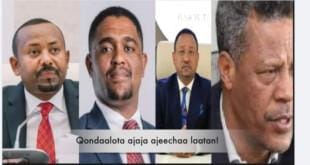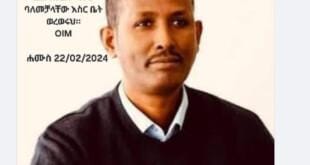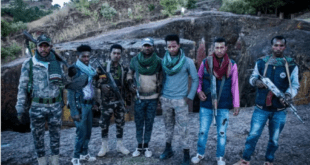With more than 200 deaths and a massive crackdown unimaginable just a few months ago, the ruling prosperity party is now the most significant threat to Ethiopia’s collective existence and democratic future. The anomalous grouping that does not reflect key features of Ethiopia’s social cleavages and political fault lines is the handmaiden of the Prime Minister, built around him and his worldviews to consolidate his personal power. With the repression and display of force that followed Haacaaluu’s assassination, confidence in the ability of this party and the Prime Minister to steer the country through these uncharted terrains plumbed new lows, especially among the Oromo community. The Prime Minister’s prominent supporters today are remnants of the bloody Derg regime and proponents of the decadent, monarchist, neftegna order that dehumanized, subordinated and squashed the dignity of people of the south. While this is a momentary tactical alliance, this alignment, in and of itself, should be worrying for the future of the Ethiopian state and its diverse people. The central ideological battle that is playing out today is a battle to define the character of the Ethiopian state. Will it be a unitary system that celebrates the culture, language, and values of a single people in the name of Ethiopia and ‘Ethiopiawinet’ or would it remain a nation of nations committed to multi-nationalism, pluralism, and unity in diversity? This is the defining question of our time and those who believe in a culturally diverse, normatively pluralistic, and multinational state could not trust the PM. It is not what he says that is of concern. It is what he does. I think there is still a tiny chance of redeeming Ethiopia as a project. This requires reconstructing it anew, to open it up to all the voices and cultures within it, and build a country that works for everyone. The Prime Minister’s approach, which is primarily about looking back to history to uncover a non-existent glorious past and resurrect controversial symbols and kings – that is a nonstarter for most. The country needs to look forward into the future. An institutional instantiation of this would mean returning to the transitional process, and working towards a genuine and all inclusive national dialogue process. And of course you cannot have a national dialogue while jailing critical stakeholders on the future of the nation. All those jailed, from Jawar Mohammed, to Bekele Gerba, to Eskinder Nega, to Shigut Geleta, to Dajane Tafa, to Hamza Borana to … they are all critical stakeholders. The Prime Minister must understand that he does not have a democratic mandate to do a lot of things he is doing. Transitioning the country is not his personal mandate. We will say this until these individuals are released and the government returns to the transitional process. Because the best favor one could do to the government and the nation at this critical stage is to offer criticism. In any event, it seems to me that Haacaaluu’s assassination would be a watershed moment. Ethiopia before the assassination of Haacaaluu Hundeessaa and after could not be the same
Check Also
OROMO CIVILIANS CONTINUE TO BE TARGETED BY FANO MILITIA
Amhara Fano continued to attack Oromo civilians. In this latest incident, at least 17 people …




